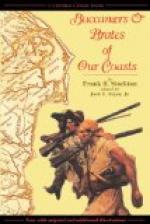It is not necessary for us to enter very deeply into the consideration of the policy of Columbus toward the people of the islands of the West Indies. His second voyage was nothing more than an expedition for the sake of plunder. He had discovered gold and other riches in the West Indies and he had found that the people who inhabited the islands were simple-hearted, inoffensive creatures, who did not know how to fight and who did not want to fight. Therefore, it was so easy to sail his ships into the harbors of defenceless islands, to subjugate the natives, and to take away the products of their mines and soil, that he commenced a veritable course of piracy.
The acquisition of gold and all sorts of plunder seemed to be the sole object of this Spanish expedition; natives were enslaved, and subjected to the greatest hardships, so that they died in great numbers. At one time three hundred of them were sent as slaves to Spain. A pack of bloodhounds, which Columbus had brought with him for the purpose, was used to hunt down the poor Indians when they endeavored to escape from the hands of the oppressors, and in every way the island of Hayti, the principal scene of the actions of Columbus, was treated as if its inhabitants had committed a dreadful crime by being in possession of the wealth which the Spaniards desired for themselves.
Queen Isabella was greatly opposed to these cruel and unjust proceedings. She sent back to their native land the slaves which Columbus had shipped to Spain, and she gave positive orders that no more of the inhabitants were to be enslaved, and that they were all to be treated with moderation and kindness. But the Atlantic is a wide ocean, and Columbus, far away from his royal patron, paid little attention to her wishes and commands; without going further into the history of this period, we will simply mention the fact that it was on account of his alleged atrocities that Columbus was superseded in his command, and sent back in chains to Spain.
There was another noted personage of the sixteenth century who played the part of pirate in the new world, and thereby set a most shining example to the buccaneers of those regions. This was no other than Sir Francis Drake, one of England’s greatest naval commanders.
It is probable that Drake, when he started out in life, was a man of very law-abiding and orderly disposition, for he was appointed by Queen Elizabeth a naval chaplain, and, it is said, though there is some doubt about this, that he was subsequently vicar of a parish. But by nature he was a sailor, and nothing else, and after having made several voyages in which he showed himself a good fighter, as well as a good commander, he undertook, in 1572, an expedition against the Spanish settlements in the West Indies, for which he had no legal warrant whatever.




